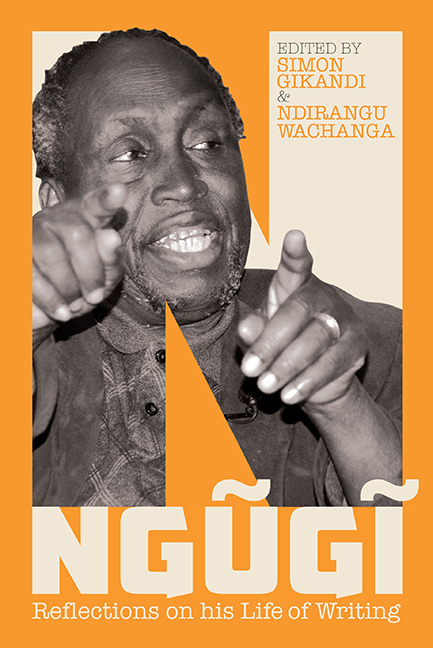Book contents
- Frontmatter
- Contents
- Preface
- Acknowledgements
- Chronology
- Photographic Section
- Introduction: Ngũgĩ wa Thiong'o: Reflections on His Life of Writing
- Ngũgĩ at Work
- Part I Serenades & Beginnings
- 1 Hyperbolic Praise Poetry for Ngũgĩ @80 … In Imitation of African Orature
- 2 A Song at Dawn (for Ngũgĩ wa Thiong'o)
- 3 Ngũgĩ in Eritrea
- 4 Up From Makerere: On the Publication of Weep Not, Child
- 5 Encountering Ngũgĩ at Leeds: An Interview with Peter Nazareth
- 6 The Book that Made Me: On Weep Not, Child
- 7 Note from a Literary Son
- 8 What is in a Name?
- 9 In Exile: Between Britain & Kenya
- Part II Memories, Recollections & Tributes
- Part III Working with Ngũgĩ
- Part IV The Writer, the Critic & the World
- Part V The Other Ngũgĩ
- Appendixes
- References
- Bibliography of Ngũgĩ's Primary Works
- Works Cited
- Notes on Contributors
- Index
4 - Up From Makerere: On the Publication of Weep Not, Child
from Part I - Serenades & Beginnings
Published online by Cambridge University Press: 27 July 2019
- Frontmatter
- Contents
- Preface
- Acknowledgements
- Chronology
- Photographic Section
- Introduction: Ngũgĩ wa Thiong'o: Reflections on His Life of Writing
- Ngũgĩ at Work
- Part I Serenades & Beginnings
- 1 Hyperbolic Praise Poetry for Ngũgĩ @80 … In Imitation of African Orature
- 2 A Song at Dawn (for Ngũgĩ wa Thiong'o)
- 3 Ngũgĩ in Eritrea
- 4 Up From Makerere: On the Publication of Weep Not, Child
- 5 Encountering Ngũgĩ at Leeds: An Interview with Peter Nazareth
- 6 The Book that Made Me: On Weep Not, Child
- 7 Note from a Literary Son
- 8 What is in a Name?
- 9 In Exile: Between Britain & Kenya
- Part II Memories, Recollections & Tributes
- Part III Working with Ngũgĩ
- Part IV The Writer, the Critic & the World
- Part V The Other Ngũgĩ
- Appendixes
- References
- Bibliography of Ngũgĩ's Primary Works
- Works Cited
- Notes on Contributors
- Index
Summary
Although I risk oversimplification, it is probably correct to say that it does not finally matter who wrote what, but rather how a work is written and how it is read. (Edward Said, ‘The Politics of Knowledge’ 385)
In reflecting on Weep Not, Child, I think it is important to first talk about James Ngũgĩ who became James Thiong'o Ngũgĩ in 1960 then later Ngũgĩ wa Thiong'o. I think it is also useful to build the context of the definition of key literary concerns in the East African region that revolved around the publication of Weep Not, Child, including a summary appraisal of Ngũgĩ's time at Makerere University College in the East Africa of the late 1950s and early 1960s. Ngũgĩ himself has said a lot about this time in his essays and memoirs. In fact, because he takes this time as definitive for himself as an author, he has now written a memoir, Birth of a Dream Weaver, specifically remembering his time at Makerere. Ngũgĩ has made his attachment to Makerere a public matter, and many of us know that whenever it is possible for him to come back to visit Makerere, however briefly, he does so. He visited Makerere University again in July 2013 to celebrate 50 years of the University of East Africa. My own impression is that while Ngũgĩ has traveled and his literary work has gone places, his time at Makerere remains important to him as a writer. During Ngũgĩ's time, as he humorously commented in his keynote address at Makerere University in 2013, denying someone entry to Makerere was like denying him a wife. It was that fundamental.
I have read some of the materials on Ngũgĩ's time at Makerere in the University library's archive, and these reveal the vibrant spirit of the period and the power of the sense of change in the 1960s. There is also an abundance of comments on Ngũgĩ in this archive. In a letter of recommendation written on 13th November, 1963, a year before the publication of Weep Not, Child, Professor G. Walton, the then Head of the English Department, describes Ngũgĩ as
a man of considerable ability and real personal interest in literature. His written work is always of good quality and he achieves an A mark from time to time.
- Type
- Chapter
- Information
- NgugiReflections on his Life of Writing, pp. 41 - 44Publisher: Boydell & BrewerPrint publication year: 2018



